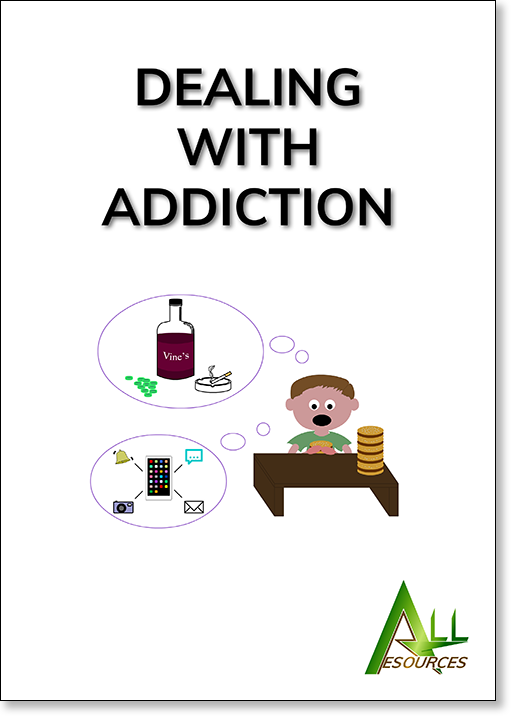Gaming Addiction and Young People

Dealing with Addiction
Providing the facts about substance abuse, gambling, gaming & food addiction as well as how to help people recover from addiction.
- Age range: 12 years and upwards
- Category: Schools
- Last revised: 2021
- Pages: 83
- Illustrated throughout
Hard copy: £35.99 add to basket
All young people love playing games. As children grow and develop, games help children interact with others and assist them in developing communication skills. Another benefit of game playing is that it is a great way to relax after a busy day. Games are made to be enjoyed, and this includes computer games and online video games.
However, If your child spends long hours playing video games each day, and if they neglect other activities in favour of gaming, there may be a problem. So what causes it to be a problem, and why do young people become addicted to gaming?
What is Gaming Addiction?
Gaming addiction is a serious mental health issue and it affects many people worldwide. It is now such a problem that the World Health Organisation (WHO) has listed it in their ‘International Classification of Diseases’ and has labelled it ‘Gaming Disorder’. Gaming can become an addiction when a young person puts gaming before all other things, including family and school. In extreme cases a gamer may forget to wash, eat or sleep because they are completely obsessed with gaming.
Game developers also provide in-game purchases so that gamers can buy additional tools to help them reach the next level, so not only are they investing huge amounts of time, they are also spending money as part of the gaming experience. So, how can a parent or carer tell if a young person is addicted to gaming and what are the symptoms of gaming addiction?
.Some of the symptoms of gaming addiction among children include:
- Putting gaming before school, hobbies, meals or time with family — school grades will suffer and relationships with friends and family will begin to deteriorate as a result of gaming.
- Being totally consumed with gaming all the time — thinking about their last game/next game — it becomes an obsession and gaming becomes a major part of their life.
- Losing control over gaming — in other words having no control over whether they play or not — they may have a strong urge to play even when they need to eat or sleep.
- Becoming irritable and short-tempered — they exhibit mood swings and disappointment after a game.
- Lying to loved ones — when questioned they lie to family and friends about their gaming activities.
So what can parents or carers do if they suspect their child is addicted to video games? The following suggestions may help:
- Encourage them to take part in other activities such as sport or athletics. Physical exercise can increase serotonin levels in the brain which can boost their mood and improve their sleep and self-esteem.
- Take part in their gaming world — get involved and play an active role in their games which will help keep their gaming safe and sensible.
- Set healthy limits for the amount of time they can play online. Be consistent — if you say they can play for an hour, you must stick to it — no more and no less!
- Replace gaming with enjoyable family activities such as family outings or meals out.
- Do not ask them to stop playing mid-game. Be polite and respectful and allow them to finish their game — this will go a long way towards ensuring they cooperate because they will realise you are being reasonable and fair.
Finally, remember that help is available to treat video game addiction. This may involve CBT sessions as well as individual and family therapy sessions. This will help everyone explore and address potential issues in the gamer’s family which may be contributing to the addiction. Speak to your GP and ask to be referred to an addiction counsellor who can provide details of the support available.


